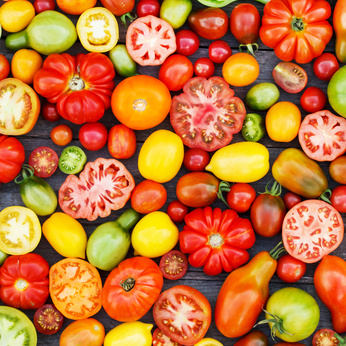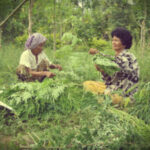Why do a top 10 list when you can do 12?
1. IT TASTES BETTER
 One cool thing about growing your own food is the ability to try new varieties of produce. Seed catalogs and garden centers offer numerous options in varying colors and shapes. For example, thousands of varieties of tomatoes are available, versus the simple red, round tomato in supermarkets. A large-scale tomato farmer needs to grow varieties that ripen all at once for a more economical harvest that can survive shipping while a home gardener can select tomatoes for flavor, size, and color. The same is true for many other crops. It’s an adventure in food!
One cool thing about growing your own food is the ability to try new varieties of produce. Seed catalogs and garden centers offer numerous options in varying colors and shapes. For example, thousands of varieties of tomatoes are available, versus the simple red, round tomato in supermarkets. A large-scale tomato farmer needs to grow varieties that ripen all at once for a more economical harvest that can survive shipping while a home gardener can select tomatoes for flavor, size, and color. The same is true for many other crops. It’s an adventure in food!
In addition, store-bought veggies are not fresh. You won’t have that problem when you can pick them straight from the source and put them in your dinner that night. Produce found in the grocery store is typically picked half-ripe, having an effect on its flavor. This is why there’s a new emphasis on “vine ripened” produce. Build yourself a survival garden and have all the vine ripened food you want.
2. SAVE MONEY
Having a garden supplements your household food supply and saves money on food. Instead of spending your dollars at the store, spend time in the garden, outside, exercising, and learning to grow your own food. With many plants, you can use the seed from one growing season to provide plants for the next. It’s a self-sustaining cycle that will cost you only a little time to keep going. All you need is a plan.
3. PROTECT FUTURE GENERATIONS
“We have not inherited the Earth from our fathers, we are borrowing it from our children.”
4. PREVENT SOIL EROSION
The Soil Conservation Service estimates more than 3 billion tons of topsoil are eroded from the United States’ croplands each year. That means soil erodes seven times faster than it’s built up naturally. Soil is the foundation of the food chain in organic farming. However, in conventional farming, the soil is used more as a medium for holding plants upright so they can be chemically fertilized. As a result, American farms are suffering from the worst soil erosion in history. If you grow your own food, you’ll be contributing less this and a plethora of other problems related to mono culture food production.
5. YOUR HEALTH WILL IMPROVE
 Not only will you end up eating more fruits and vegetables, but you will be getting added exercise. Did you know that you can burn as many calories in 45 minutes of gardening as you can in 30 minutes of aerobics? And, working in the garden is a natural stress reducer. (I can attest to this) Your garden is also a great way to beautify your home environment and your community with sustainable eatable planting.
Not only will you end up eating more fruits and vegetables, but you will be getting added exercise. Did you know that you can burn as many calories in 45 minutes of gardening as you can in 30 minutes of aerobics? And, working in the garden is a natural stress reducer. (I can attest to this) Your garden is also a great way to beautify your home environment and your community with sustainable eatable planting.
6. SAVE ENERGY
American farms have changed drastically in the last three generations, from family based small businesses dependent on human energy to large-scale factory farms. More energy is now used to produce synthetic fertilizers than to till, cultivate and harvest all the crops in the United States. If you are growing your own food in the city, you are cutting down on transportation and pollution costs. Think of all the energy it takes just to move food to your local market. Isn’t it funny that we don’t even think twice about eating a banana in the middle of a cold North American winter?
7. KEEP CHEMICALS OFF YOUR PLATE
Many pesticides approved for use by the EPA were registered long before extensive research linking these chemicals to cancer and other diseases had been established. Pesticides are poisons designed to kill living organisms and can also harm humans. In addition to cancer, pesticides are implicated in birth defects, nerve damage and genetic mutations. Both organic and conventional pesticides have health risks. While some studies show them as safe, why bother when you can grow your own food and not use them at all? You have the control over what goes into your food!
8. PROMOTE BIODIVERSITY
Monoculture is the practice of planting large plots of land with the same crop year after year. While this approach tripled farm production between 1950 and 1970, the lack of natural diversity of plant life has left the soil lacking in natural minerals and nutrients. To replace the nutrients, chemical fertilizers are used, often in increasing amounts. Single crops are also much more susceptible to pests, making farmers more reliant on pesticides. Despite a tenfold increase in the use of pesticides between 1947 and 1974, crop losses due to insects have doubled-partly because some insects have become genetically resistant to certain pesticides. In addition these mono crop fields have totally the destroyed bio-diverse ecosystems that once thrived. Don’t think that “organic” products are the solution either. There are many large organic monoculture farms pumping out product too. It’s all the same business.
9. HELP BEAUTIFY YOUR COMMUNITY
Besides being used to grow food, community gardens are also a great way to beautify and connect a community.
10. TEACH YOUR CHILDREN

Pass on important skills to your children. Teach them that food doesn’t come from the supermarket but from the soil, the earth that we all depend on. Walk them through the cycle of life that begins with a seed and ends with a harvest. Teach them how the animals also play a role in the cycle. Teach them that like plants, animals also become food for other animals. It’s a beautiful cycle of energy. Prepare the little ones to be self-sufficient so that they can be if the need arises!
11. EMBRACE SEASONAL EATING
Growing your own produce allows you to reconnect with the natural cycle of life through the seasons. It’s eating more fresh produce when it is in season, and preserving produce for times when it’s not available. My family has an Exclaibur Food Dehydrator because it has plenty of capacity and isn’t very noisy. I highly suggest them. If you’re on a budget the Nesco Gardenmaster ones are great too.
Our paleolithic ancestors didn’t have dehydraters, but they did have the sun. They lived, hunted and gathered based on the seasons. A garden is a good way to take a small step back into our roots. You can even garden in animal skin undies if you’d like!
12. BE READY FOR DISASTER

This final and important fact is that having a food source that you control keeps you more ‘food secure’ in the event of disaster. Simply having a survival cache to keep you going while you’re waiting out a ferocious storm or when society has come to a standstill could really make all the difference when you’re desperately hungry. Nuclear wars, Jesus coming back, alien invasions, and zombie apocalypses are a few reasons to build a survival garden and grow your own food.
I would like to be ready with a some tomatoes, a rifle, a cup of Juanilama tea, duck stew and some tasty moringa chicken salads to ride it out…..whoohoo!



GIPHY App Key not set. Please check settings